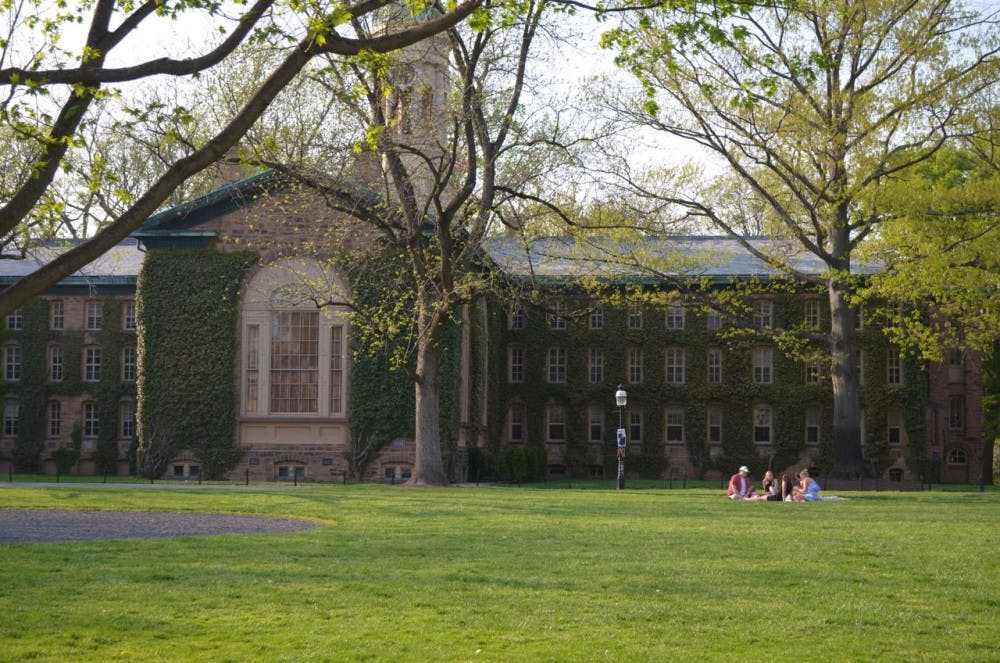On March 16, the Undergraduate Student Government (USG) hosted a virtual town hall with Dean of the College Jill Dolan, Vice President for Campus Life W. Rochelle Calhoun, and other campus administrators to discuss the new COVID-19 protocols, such as the elimination of the universal indoor mask mandate and the shift from weekly testing to monthly testing for the second half of the Spring 2022 semester.
Also at the town hall, Director for Global Safety and Security TJ Lundadi said that a new set of travel guidelines will be rolled out next week.
“It will include allowing international undergraduate travel that’s University sanctioned,” Lundadi said. “We’ll be able to get back out in the world as we want.”
Vice President for Environmental Health and Safety Robin Izzo began the event by explaining the deciding factors that led to the decision to eliminate the masking and weekly testing requirements.
“We need to find a way to live with [COVID-19] responsibly in a way that is allowing the types of experiences that we want to have on our campus,” Izzo said. “What we wanted first was to move from using testing as a mitigation strategy to using testing as a way of monitoring and looking for shifts in the positivity rates to help us to prepare for and make whatever shifts are necessary.”
Izzo also emphasized the high vaccination rate on campus, which stands at 99 percent for undergraduate students, as well as the widespread availability of KN95 masks at the University as reasons behind lifting the mandate.
Director of Medical Services Melissa Marks discussed the high contagion levels of the omicron variant and its comparatively low severity in terms of course of illness.
“What we were seeing from [the rise in cases for students] was not spread to faculty and staff in the severity of the illness,” Marks said.

Dolan emphasized that although masks are optional for all public spaces, professors and other instructors are authorized to set masking requirements in classrooms for the foreseeable future.
Students in performing arts groups will also not be required to wear masks during performances.
Izzo explained that the main purpose of the new monthly testing requirement is to look for trends in the positivity rate. She did emphasize that tests will be available to those who want to test more than once a month.
“Anyone who wants to continue to test regularly may do that,” Izzo said.

“We would also encourage people who feel that they are at a higher risk with COVID-19 to take advantage of [the availability of] testing,” Calhoun added.
Although students have tested for COVID-19 this month coming back from spring break, according to the alphabetical distribution, those who have to test the last two weeks of the month are still required to. Students whose last names begin with A-E test the first week of each month, F-K the second, L-R the third, and S-Z the fourth.
According to Marks, if a student gets the virus, recovers from the virus, and then later tests positive within the University system, they will have to isolate.
Marks also emphasized that the isolation time period will remain at five days, in line with CDC guidelines.
Dolan said that students in isolation should not necessarily expect hybrid teaching to be available, as technology differs across classrooms depending on the course format. She encouraged students, however, to be creative in accessing class while in isolation.
“Faculty and partner students in classes were very creative about how they tried to bring isolated students into the classroom,” she said.
Dolan also explained that there is a Classrooms and Schedule Committee that works with facilities to renovate classrooms for lots of reasons, including audio-visual accessibility.
“We remain committed to residential teaching, not hybrid teaching,” Dolan said.
In terms of isolation housing conditions, Director for Emergency Preparedness Derek Ziegler explained that there may be changes to the housing, including isolated students getting individual rooms, instead of having to share their room with another person.
“We’re hoping to move away from having double rooms in our isolation in 1967,” Ziegler said, in reference to the hall that has been allocated for isolation housing.
Marks explained that immunocompromised students who have caught the virus have been closely monitored by University Health Services and have fought off the virus well.
“KN95 masks are very protective for people who are vulnerable,” Dolan added. “Students who are concerned about their health should continue wearing masks. They should not fear reprisal for any reason.”
The town hall was moderated by USG President Mayu Takeuchi ’23 and Vice President Hannah Kapoor ’23. USG collected questions from students through a Google Form over spring break. For the first half of the town hall, they focused on the pre-submitted questions and for the second half, they took messages through a Zoom Q&A box.
Lia Opperman is an Assistant News Editor who often covers University affairs, student life, and local news. She can be reached at liaopperman@princeton.edu, on Instagram @liamariaaaa, or on Twitter @oppermanlia.








